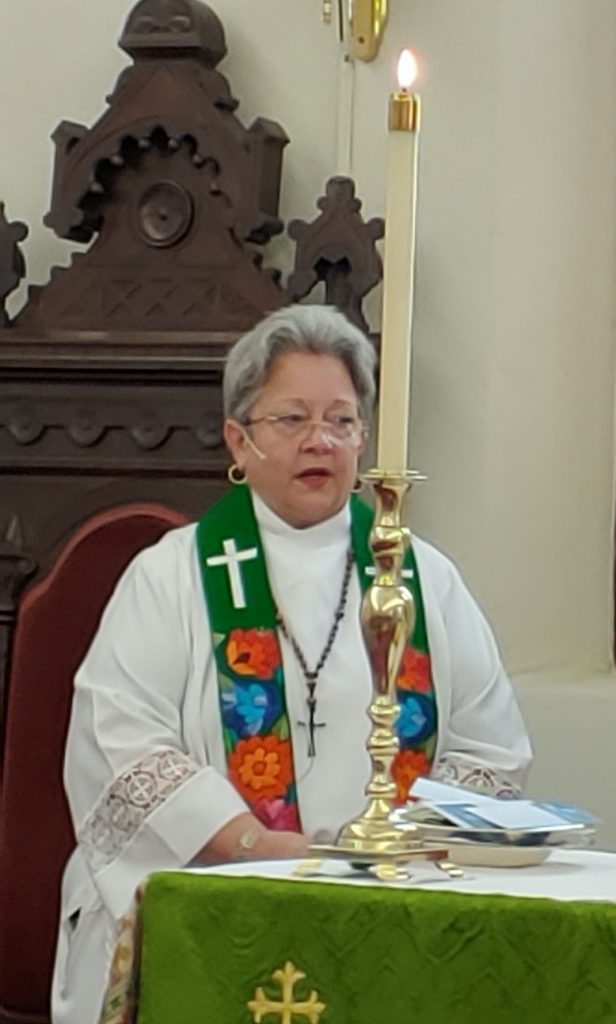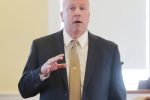Portrait of a Pastor
Rev. Karen Morris, Emmanuel Episcopal Church

How long have you been in the ministry and current church?
I was ordained to the priesthood in December of 2020 and assumed the role of Rector at Emmanuel Episcopal Church in January of 2021.
What was your calling to the ministry?
After serving in various lay ministries at my church in Wimberley (St. Stephen’s Episcopal Church) I felt that there was more I was called to do. I met with my priest, and she suggested that I enter the discernment process for Holy Orders (testing my call to the priesthood). Our Bishop approved and I spent a year with a committee ( a priest and 6 lay persons) to further explore the call. In the end, the committee and I felt that my call was to the priesthood and my Bishop made arrangements for my formal training.
How do you prepare your sermons, and what is your approach to delivering them?
I start by reading the scriptures appointed for the day (from the Revised Common Lectionary). I read commentaries on the scriptures and seek to identify the message appropriate for my congregation, where they are, what we are doing as a community, and then put those thoughts supported by the scriptures into a sermon. I write out the complete sermon and generally follow it in my delivery.
What is your favorite part of the job?
I love my job, but by far my favorite part is seeing the children learn to love God. We involve our kids in our worship services and have Christian Formation classes for them every Sunday. I strive to make them feel like and important part of our worship and ministry.
Can you share an example of a challenging situation you faced in ministry and how you handled it?
Where to start…. The current political climate is probably the most challenging aspect of my job right now. We have members from all political corners. My goal is to set, for all of us, the teachings of Jesus and the vows that we all took at our baptism. To love God, love our neighbors, take care of the poor and the marginalized, to welcome the stranger and to respect the dignity of every human being. If we can agree to keep our focus on doing these things we will be OK.
What are your goals for the future of this church community?
Our vision: Emmanuel Episcopal Church will be a community of passionate servants who live out God’s ever-present love through inspiring worship, faith-forming discipleship and active ministries that make an impact in the church, the community and the world.
With that in mind, it is our goal to continue to welcome all who come to Emmanuel, to involve everyone in service within the church and out in the community – to make an impact on the lives of our neighbors and to share with them the love of God
How do you approach pastoral care for individuals and families?
Personally, I am available to anyone that needs to talk, I stay in touch with those in our congregation that are going through difficult times. We also have a ministry team that takes communion to those that are homebound and calls to check in on those that we don’t see at services to make sure they are OK.
What is your understanding of the church’s role in community outreach?
The church does not exist only to sit in the pews and worship on Sundays. The work of the church is outside the building. To that end, our leadership group sets goals each year to reach beyond the walls and to make a difference in our community and our world.
What type of classes, if any, are being offered to the church membership/public?
We have Christian formation classes for children and adults between our 2 worship services on Sunday (9:30-10:15). All are welcome.
What version of the Bible do you preach from, and why that particular version when there are other choices to choose from?
We use the New Revised Standard Version Bible (with Apocrypha) which is authorized by the Episcopal Church for use in worship. Other translations are also authorized and used for Bible study and personal use, but this is the most common version used for worship services. It is considered to be “as literal as possible and as free as necessary.”


